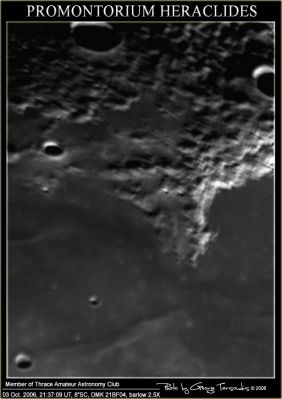Promontorium Heraclides
Contents
Promontorium Heraclides (and Cassini's Moon Maiden)
|
Lat: 40.3°N, Long: 33.2°W, Diam: 50 km, Depth: 1.7 km, Rükl: 10 |

George Tarsoudis
Promontorium Heraclides during local morning light. Ancient lunar observers such as Cassini thought they saw the head of a woman in this promontory, hence the name Cassini's Moon Maiden.
Images
LPOD Photo Gallery Lunar Orbiter Images Apollo Images
- AS15-93-12714 shows Promontorium Heraclides above the centre of this orbital Hasselblad photograph, and Montes Jura at the horizon (Sinus Iridum in between, and Mare Imbrium's western part in the foreground). - DannyCaes Dec 24, 2007
Maps
(LAC zone 24A4) LAC map Geologic map
Description: Elger
(IAU Directions) THE HERACLIDES PROMONTORY.--The less lofty but still very imposing headland at the W. end of the Sinus Iridum, rising more than 4,000 feet above it. It consists of a number of distinct mountains, forming a triangular-shaped group running out to a point at the S.E. extremity of the bay, and projecting considerably beyond the shore-line. There is a considerable crater on the W. side of the headland, not visible till a late stage of sunrise. It is among the mountains composing this promontory that some ingenuity and imagination have been expended in endeavouring to trace the lineaments of a female face, termed the "Moon-maiden."
Description: Wikipedia
Additional Information
- Depth data from Kurt Fisher database
- Viscardy, 1985: 1.7 km
- Cherrington, 1969: 1.79 km
- Curious elongated depression just northeast of (adjacent to) Promontorium Heraclides, see HiRes scan of Lunar Orbiter 4's frame 145-h2. - DannyCaes Apr 4, 2014
Luna 17 and Lunokhod 1
- Lunokhod 1, the unmanned rover which was delivered by the lander Luna 17, crawled its way to 38°17' North/ 35° West (southwest of Promontorium Heraclides).
- Images of the explored lunar surface, made by Lunokhod 1, are online in Don P. Mitchell's excellent site Soviet Moon Images. - DannyCaes Dec 24, 2007
Cassini's Moon Maiden
- Promontorium Heraclides is famous for its representation as a "Moon Maiden" with flowing hair in the 1679 engraving of Giovanni Domenico Cassini's map. It has been suggested that the Moon Maiden is a drawing of Cassini's wife in profile. Launay and Sheehan (2010) expand at great length on this theme, but without adding any new evidence. They also believe the strange system of ridges shown in Mare Serenitatis in the same map has been intentionally drawn to resemble a heart, and the rays of Copernicus to create a dragonfly (with Copernicus as the eye).
Nomenclature
- Named for Heraclides Ponticus (c. 388-310 B.C.), a Greek astronomer and philosopher said to have proposed that the Earth revolves daily on its axis.
- Prom. Heraclides was Catalog number 1641 in the original IAU nomenclature of Named Lunar Formations, where it is attributed to Riccioli (who according to Whitaker, page 212, used Heraclides Ponticus, although his map seems to say Heraclides).
- The name was Latinized to Promontorium Heraclides in the 1960's.
- Strange to say, Promontorium Heraclides is called "Hercules Promontary" on page 312 of David M. Harland's book Exploring the Moon; the Apollo expeditions (1999, Springer Verlag).- DannyCaes Dec 11, 2012
LPOD Articles
APOD Articles
Bibliography
- Hill, Harold. A Portfolio of Lunar Drawings, page 88.
- Launay, Françoise and Willam Sheehan. 2010. "The Mysterious Lady on the Moon." Sky and Telescope Vol. 120 (No. 3, September issue), pp. 26-30.